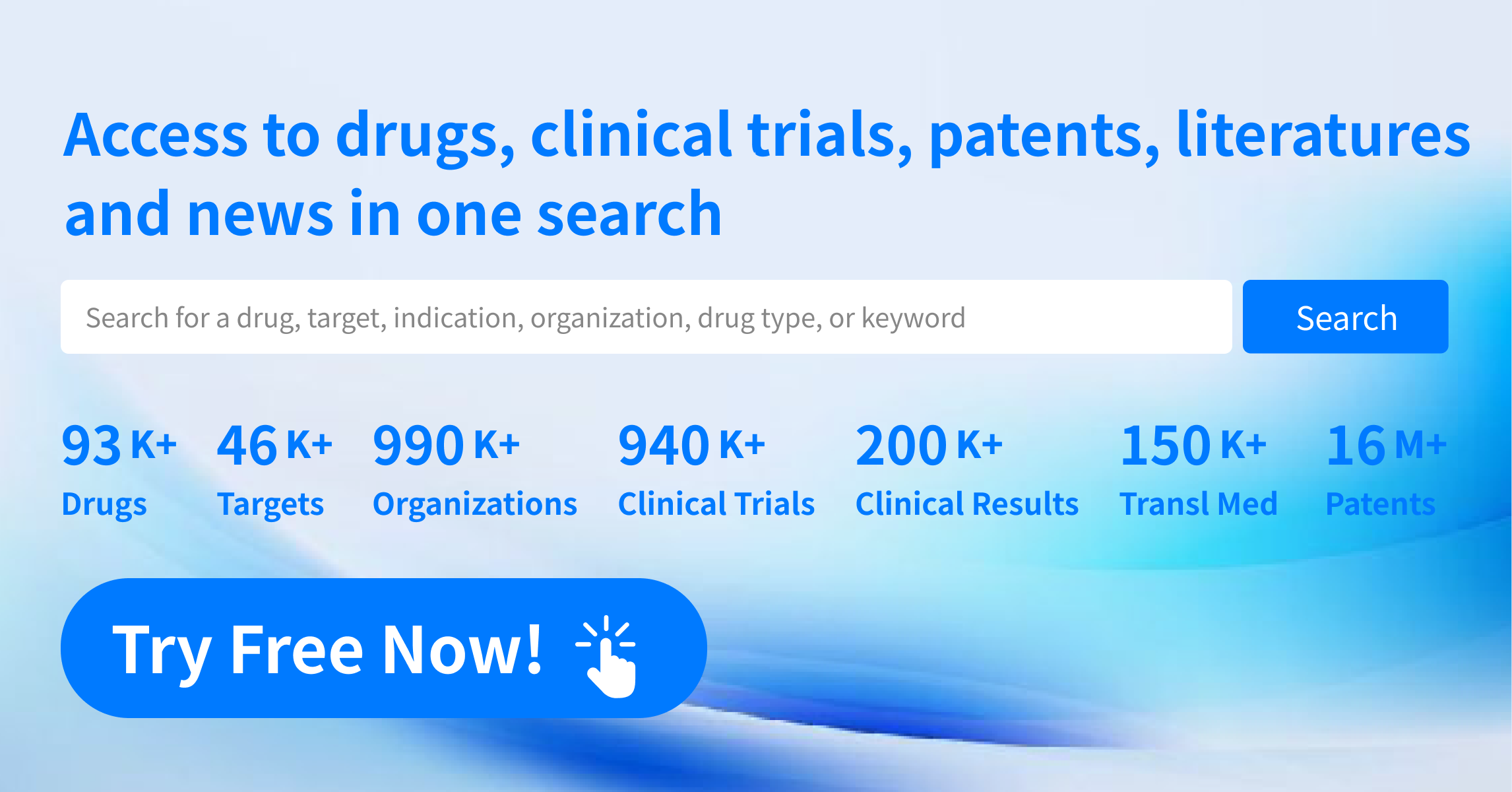Pharma Frontiers: Daily Digest of Global Pharmaceutical News – Aug 9
1.Amneal's Extended-Release Parkinson's Oral Therapy Receives FDA Approval for Market Launch
On August 8, Amneal Pharmaceuticals announced that the US FDA has approved the marketing of Crexont (Carbidopa and Levodopa) extended-release capsules, used for the treatment of Parkinson's Disease (PD). Crexont is a novel oral Carbidopa/Levodopa preparation that combines both immediate-release (IR) and extended-release (ER) particles, aiming to provide a better treatment experience for PD patients. There are approximately one million PD patients in the US alone, with around 90,000 new cases each year. Every six minutes, a new patient is diagnosed with Parkinson's Disease. Existing oral immediate-release Carbidopa and Levodopa products have a short duration of action; as the disease progresses, patients may experience more fluctuations in motor ability. In the treatment of PD, it is necessary to improve the formulation of oral Carbidopa and Levodopa, reduce the number of daily doses, and achieve better therapeutic effects. In the RISE-PD clinical trial, compared to immediate-release Carbidopa and Levodopa, Crexont added an extra half hour of “good on” time daily, an index assessing patients without motor disorder symptoms. Crexont is taken three times daily on average, compared to the immediate-release form which is taken five times a day. Crexont is an innovative oral formulation that contains immediate-release Carbidopa and Levodopa particles for quick onset and also contains extended-release Levodopa particles for sustained efficacy. Co-CEOs of Amneal, Chirag and Chintu Patel, stated “The approval of Crexont marks a pioneering moment in the treatment of Parkinson’s disease. The burden of this incurable neurodegenerative disease increases over time. Some Parkinson's patients undergoing IR CD/LD treatment take up to 10 doses per day, yet still experience complications of movement symptom fluctuations. Compared to IR CD/LD, Crexont's innovative formula provides a longer 'on' period with fewer dosing frequencies."
2.GlaxoSmithKline's anti-PD-1 monoclonal antibody Jemperli approved for marketing in Singapore
On August 7, GlaxoSmithKline (GSK) Singapore announced that the Health Sciences Authority of Singapore (HSA) has approved a new indication for Jemperli (dostarlimab), namely its use in combination with carboplatin and paclitaxel, followed by Jemperli as a single agent for the treatment of primary advanced or recurrent endometrial cancer in patients with deficient mismatch repair (dMMR) or high microsatellite instability (MSI-H). According to a GSK press release, this approval makes Jemperli the first-line immunotherapy for dMMR/MSI-H primary advanced or recurrent endometrial cancer in Singapore, eligible for early treatment in these patients. Jemperli was previously approved by the Singapore HSA as a monotherapy for adult patients with dMMR recurrent or advanced endometrial cancer who progressed at any time after a previous platinum-containing regimen and were not candidates for curative surgery or radiation. Dostarlimab (trade name: Jemperli) is a programmed death receptor-1 (PD-1) blocking antibody that binds to the PD-1 receptor and blocks its interaction with PD-L1 and PD-L2 ligands. The product was first granted accelerated approval by the US FDA in April 2021, subsequently obtaining multiple tumor indications covering dMMR advanced or recurrent endometrial cancer, dMMR or MSI-H primary advanced or recurrent endometrial cancer, dMMR recurrent or advanced solid tumors, and all primary advanced or recurrent endometrial cancer in adult patients. The documents submitted by GSK to the Singapore regulatory authority include the interim analysis results of the first part of the phase III RUBY/ENGOT-EN6/GOG3031/NSGO trial, with a median follow-up of 25 months. The trial reached the primary endpoint of progression-free survival (PFS) evaluated by researchers, indicating that patients receiving Jemperli + carboplatin and paclitaxel treatment in the dMMR/MSI-H population have statistically and clinically significant benefits.
3.Novartis' potential blockbuster therapy Fabhalta receives FDA approval for expanded indications
On August 7, the official website of the US FDA showed that the FDA has approved Novartis’s potential blockbuster therapy, Fabhalta (iptacopan), for expansion of its indications for reducing proteinuria levels in adult patients with IgA nephropathy (IgAN), who are at risk of rapid disease progression. A previous press release from Novartis states that Fabhalta is the first IgAN therapy that targets the alternative complement pathway. This approval is largely based on the positive results of the Phase III APPLAUSE-IgAN clinical trial, which was a randomized, double-blind, placebo-controlled study. The study evaluated the efficacy and safety of Fabhalta in 518 adult patients with primary IgAN. The two primary endpoints of this research are the patient's 24-hour urinary protein to creatinine ratio (UPCR) and the estimated glomerular filtration rate (eGFR) slope within 24 months. Previously released interim analysis data show that the Fabhalta treatment group had a 38.3% reduction in proteinuria 9 months after treatment (p<0.0001), reaching the primary endpoint of the trial, compared to patients receiving placebo and supportive treatment. Another primary endpoint of the study is to evaluate the ability of Fabhalta to slow the progression of IgAN by measuring the annual eGFR slope within 24 months, with the data expected to be announced when the study is completed in 2025. The study also shows that Fabhalta has good safety and tolerability, consistent with previously reported safety characteristics. Fabhalta is an orally specific alternative complement pathway factor B inhibitor, efficiently inhibiting factor B in the alternative complement pathway. It is effective in treating various diseases caused by the dysfunction of the alternative pathway, without affecting other complement pathway-mediated immune responses to microbial invasions, thereby reducing the risk of infection in patients. Fabhalta is one of Novartis' key development projects and has the potential to treat a variety of indications. In December 2023, it was approved by the FDA for the treatment of adult paroxysmal nocturnal hemoglobinuria (PNH) as the first oral monotherapy.
4.Amgen's combination therapy of KRAS and EGFR inhibitors has been granted Priority Review status by FDA
Recently, in its Q2 2024 financial report, Amgen announced that its combination therapy of Lumakras (sotorasib), a KRAS G12C inhibitor, and Vectibix (panitumumab), an EGFR inhibitor, for the treatment of metastatic colorectal cancer with KRAS G12C mutations, has been accepted by the FDA. The regulatory application was also granted priority review status, with an expected completion date of October 17 this year. The submission was based on positive results from the phase 3 clinical trial, CodeBreaK 300. As previously published in the New England Journal of Medicine, the median progression-free survival (PFS) at seven months' follow up was 5.6 months for the group receiving 960mg Lumakras combined with Vectibix, 3.9 months for those receiving 240mg Lumakras combined with Vectibix, and 2.2 months for those receiving standard treatment. The risk of disease progression or death was reduced by 51% (HR=0.49, 95% CI, 0.30-0.80, p=0.006) in the group receiving the 960mg Lumakras combination therapy and by 42% (HR=0.58, 95% CI, 0.36-0.93, p=0.03) in the group receiving the 240mg Lumakras combination therapy. Moreover, the objective response rate (ORR) was 26.4% in the 960mg Lumakras combination group and 5.7% in the 240mg Lumakras combination group, with no response reported for the standard treatment group. Lumakras is the first FDA-approved KRAS G12C inhibitor, representing a significant breakthrough in targeting the elusive KRAS drug target. Currently, Amgen is conducting the phase 3 clinical trial, CodeBreaK 202, to evaluate the efficacy of Lumakras in combination with chemotherapy as a first-line treatment for PD-L1 negative advanced non-small cell lung cancer with KRAS G12C mutations.
5.Precision Biotechnology's groundbreaking CAR-T therapy, PCAR-19B, is expected to receive accelerated approval
On August 7, the official website of the Drug Evaluation Center (CDE) of the National Medical Products Administration (NMPA) of China disclosed that a new drug application for the PCAR-19B injection (pCAR-19B autologous cell reinfusion preparation) from Chongqing Precision Biotechnology is expected to be included in priority review. This new drug is intended for the treatment of CD19-positive relapsed or refractory B-cell acute lymphoblastic leukemia in patients aged 3 to 21. This means that this innovative CAR-T therapy is likely to receive expedited approval for market launch in China. Publicly available information shows that PCAR-19B injection, independently developed by Precision Biotechnology, is a CAR-T cell immunotherapy product developed for malignant hematopoietic system diseases originating from CD19-positive B cells. The product has optimized the CAR structure and uses a safer gene transduction carrier system, making it potentially more effective and safe. The PCAR-19B injection for pediatric and adolescent B-cell acute lymphoblastic leukemia (B-ALL) indications was approved for registration clinical research in China in 2019. According to the Phase 1 registration clinical trial data previously released by Precision Biotechnology, all 9 enrolled patients achieved complete remission (CR), with a total remission rate reaching 100%, and all patients who initially achieved complete remission (CR) also tested negative for minimal residual disease, demonstrating good overall safety and tolerance. In November 2023, the product was included in the CDE's list of breakthrough therapies for the treatment of patients aged 3-21 with CD19-positive refractory/relapsed acute lymphoblastic leukemia (ALL). Last month (July), the new drug application for the PCAR-19B injection for this leukemia indication was accepted by the CDE.
6.The Phase III study of Novo Nordisk's oral semaglutide (Rybelsus) 25mg for weight loss has been successful
On August 7th, while announcing their H1 2024 performance, Novo Nordisk revealed that the phase III OASIS 4 study on oral semaglutide (Rybelsus, 25mg) for weight reduction had been successfully completed. The study included a total of 307 overweight or obese adult participants with a Body Mass Index (BMI)≥27kg/m2 who had at least one weight-related complication (hypertension, dyslipidemia, obstructive sleep apnea, or cardiovascular disease), or a BMI≥30kg/m2. The effect and safety of weight reduction between oral semaglutide (25mg, once daily) and a placebo were evaluated. The study lasted 72 weeks, including a 1-week selection period, a 64-week treatment period, and a 7-week follow-up period. Participants in the oral semaglutide group received treatment in a dose escalation fashion over 64 weeks. For example, they received a 3mg dose from week 0-4, 7mg from week 5-8, 14mg from week 9-12, and 25mg from week 13-64. The primary endpoint of the study was the percentage change in the weight of the participants compared to the baseline during the treatment period and the number of participants whose weight decreased by at least 5%. The baseline weight of the participants was 105.9kg. The results showed that the weight of the participants in the oral semaglutide group had decreased by 13.6%, while that of the placebo group had decreased by 2.2%. If all participants completed the treatment, the weight reduction in the oral semaglutide group would be 16.6% and 2.7% in the placebo group. Furthermore, oral semaglutide demonstrated good safety and tolerability during the study. Previously, oral semaglutide had achieved its primary endpoint in a phase III weight reduction study. In May 2023, the phase III study OASIS 1 of oral semaglutide 50mg for weight reduction was successfully completed. The results showed that after 68 weeks of treatment, the weight of the patients in the semaglutide group had decreased by 17.4%, with 89.2%, 74.7%, 58.5%, and 37.2% of the patients experiencing a weight reduction of at least 5%, 10%, 15%, and 20% respectively.
7.Xgene Pharmaceutical's Innovative Painkiller XG005 Successfully Completes Phase IIb Clinical Trials for Pain Treatment of Knee Osteoarthritis
On August 8, Xgene Pharmaceutical announced significant positive results from a phase IIb clinical study evaluating the efficacy and safety of its in-development innovative painkiller XG005 in patients suffering from pain due to knee osteoarthritis. The results indicated that XG005 not only significantly outperformed the placebo in relieving patient pain, but also considerably improved joint stiffness and motor function. The study was a nationwide multicenter, placebo-controlled, double-blind phase IIb clinical trial aimed to assess the safety and effectiveness of different doses of XG005 in patients with knee osteoarthritis pain, led by Peking University People's Hospital, with a total of 26 research centers participating nationwide. The study enrolled a total of 331 moderate-to-severe pain sufferers from knee osteoarthritis, whose severity levels of knee osteoarthritis were Kellgren-Lawrence II-III. Participants were randomly divided at a ratio of 2:1:2 into the 750mg group, the 500mg group, and the placebo group, with each group taking medication twice daily for four weeks of treatment and follow-up observation. The primary efficacy endpoint was the change value relative to the baseline of the average weekly walking pain score in the 750mg treatment group compared with the placebo group in the modified Intent-to-Treat (mITT) population (the pre-specified primary analysis set) during the fourth week. Results showed that the 750mg treatment group significantly outperformed the placebo group(P=0.0055). This result was consistently validated in the Intent-to-Treat (ITT) population and Per-Protocol Set (PPS) and further confirmed by observation data and multiple imputation sensitivity analysis. XG005 significantly outperformed the placebo in all key secondary efficacy endpoints, including significant statistical differences in the WOMAC pain subscore and KOOS pain subscore for both the 750mg and 500mg dose groups (P=0.0056 and P=0.0002).
8.Hansoh Pharma and Lupeng Pharmaceutical have formed a partnership on the next-generation BTK inhibitor LP-168
On August 8, Hansoh Pharma, a leading innovation-driven pharmaceutical company in China, and Lupeng Pharmaceutical, an innovative pharmaceutical company focused on malignant tumors and autoimmune diseases, jointly announced that they have signed a collaboration agreement on LP-168, a next-generation BTK inhibitor independently researched and developed by Lupeng Pharmaceutical. According to the agreement, Hansoh Pharma has obtained the rights to research, register, produce and commercialize LP-168 for all non-cancer indications in China (including Hong Kong, Macau and Taiwan). Meanwhile, Hansoh Pharma will pay Lupeng Pharmaceutical a total of no more than RMB 729 million in upfront payments and potential milestone payments for research and development, registration, and sales-based commercialization, as well as tiered royalties of up to double-digit percentages of future net product sales. LP-168 is a small molecule Bruton's Tyrosine Kinase inhibitor (BTKi). As of now, Lupeng Pharma is conducting multiple clinical studies on LP-168, and its highest R&D stage in China is Phase II pivotal registration clinical research for tumors.
How to obtain the latest research advancements in the field of biopharmaceuticals?
In the Synapse database, you can keep abreast of the latest research and development advances in drugs, targets, indications, organizations, etc., anywhere and anytime, on a daily or weekly basis. Click on the image below to embark on a brand new journey of drug discovery!




